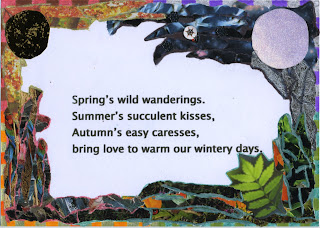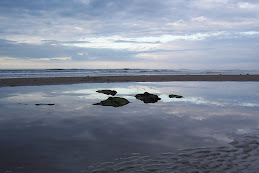Rejection. Sarah Waters speaking at the recent Scarborough Literature Festival remembered sending out
Tipping the Velvet to publishers. Three sample chapters and a synopsis plus a SAE. So when an envelope was posted through her letterbox with her own hand writing on, there was no doubt what was inside. Rejection.
Once we writers decide to seek an audience, rejection is inevitably a part of our lives. Whether it is in a tutor’s marking of an assignment; a manuscript returned from a publisher which looks like it has been handled only enough to deposit it into the pristine SAE; or a visitor exiting from ‘Words in My Head’ and saying loudly, ‘Now
this is interesting,’ on finding a painting to examine (I am, of course, happy for that artist that they were appreciated). Rejection hurts. A little or a lot. It still hurts.
How to recover from it? The age old advice of:
(a) doing something nourishing for your writing;
(b) putting the rejected material aside for a while and getting on with something else;
(c) hoarding positive comments and praise which can be referred back to at this point;
(d) after a short period of time going back to the feedback and considering whether it has anything valid to say.
To survive as a writer, somewhere inside us we need to develop a steely reed of self belief, which may bend with the comments of others, but does not snap. And there is something to learn from rejection. Whether we choose to take it on board (partly or fully) or toss it aside, we find out, in that process, about what is important to our writing and to ourselves.
I would never wish rejection on anyone, however, I do occasionally wonder at the writers who appear to get beyond it, who are in a position where it seems no-one dares to offer up even the mildest critical comment. A bit like dictators who stay in power for thirty, forty years, who must begin to believe in their own invincibility and rightness because they are not told otherwise, is this healthy for any writer?
I love Edith Sitwell’s later poems. They are what inspired ‘Words in My Head’. Though even I would have to admit that there are not an insignificant number which could have done with a good edit.
Hideous though it is, there is perhaps a danger in no longer experiencing it – and, indeed, even forgetting what it is like – the rejection.


 John explains: I just thought you may like to see the attached picture entitled ‘Golden Thread’. It is about free writing; it reads left to right. The upper horizontal line represents thoughts we are aware of, but there's lots going on beneath.
John explains: I just thought you may like to see the attached picture entitled ‘Golden Thread’. It is about free writing; it reads left to right. The upper horizontal line represents thoughts we are aware of, but there's lots going on beneath. 
